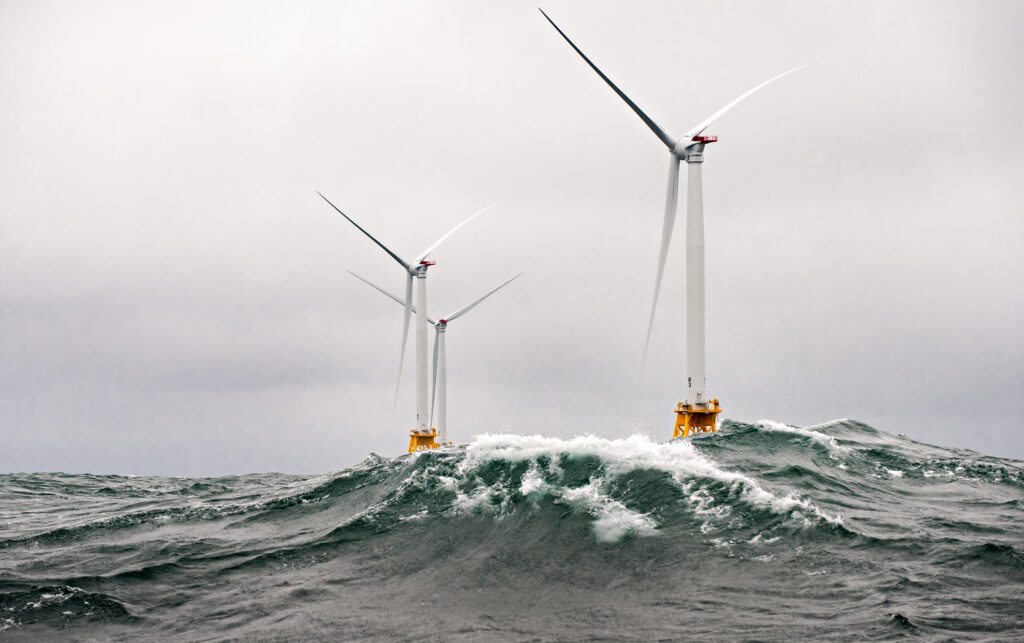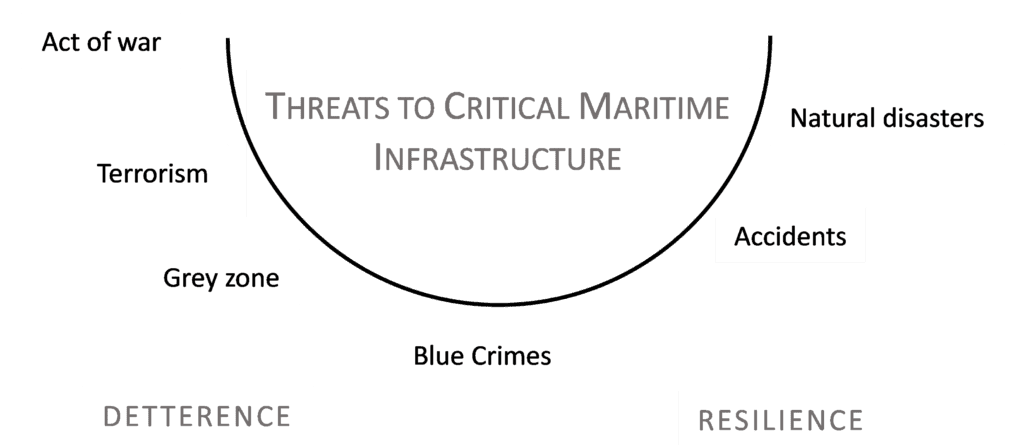The oceans host an increasingly dense assemblage of infrastructures. Energy, data cables, transport, climate mitigation infrastructure. Many of these are essential for contemporary societies.
The ocean host a growing range of infrastructures
This includes communication cables laid on the ocean floor which provide the basis for contemporary digital connections. Maritime energy infrastructures, such as offshore oil and gas platforms, wind farms, floating solar farms, tidal wave energy, underwater pipe lines and electricity cables have become vital energy supplies and also form the heart of green energy transition.

Underwater tunnels and bridges connect land masses and ensure the territorial integrity of archipelagos or the connection of regions. Offshore aquaculture provides a large share of contemporary seafood production. Shipwrecks and the maritime heritage have been turned into sites for diving and other tourism activities. Offshore breeding stations for birds and artificial reefs have become important installations in nature conservation.
Likewise, shipping is a major global infrastructure and complex in its own right: This includes a wide array of installations, including ports, ships, containers, artificial canals, lighthouses, buoys, and indeed also the more invisible routing and traffic separation schemes.
Threats, risks and vulnerabilities
The higher the density of these infrastructures, the more vulnerabilities exist to threats ranging from accidents, to blue crimes, terrorism and hostile state actions, or cyber attacks.

Our approach
Drawing on our research on subsea data cables and maritime insecurities, SafeSeas researchers have developed a substantial research agenda on critical maritime infrastructure protection.
Our core argument is that the geophysical, legal and transnational specificities of infrastructures in the sea and the threats they are facing, require tailored responses and cannot be subsumed under more general critical infrastructure policies. Protection requires dialogue, coordination and information sharing between public and private stakeholders on national, regional and global levels, as well as protective standards, surveillance, and law enforcement at sea. We also advocate for developing global norms and minimum standards.
Shaping the European Discussion
Since the attacks on the Nord Stream pipelines in the Baltic Sea in September 2022 there has been high level interest in CMIP. SafeSeas researchers have been frequently in the media to comment, and have given presentations at several events, including by the European Parliament, European Defense Agency, NATO, and the European Council.
We have contributed to, or co-organized dedicated events, including a June 2023 event on the Baltic Sea organized by the Centre for Military Studies, a July 2023 symposium on Southeast Asia co-organized with the Center for International Law of the National University of Singapore, as well as events by the Spanish navy, the Belgian government and the German Marshall Fund. In November 2023 and May 2024 we held two symposia on the North Sea.
North Sea: A test case
Since it is a paradigmatic region with an extremely high density of maritime infrastructures and major expansion plans, we have developed a particular focus on the North Sea region together with researchers at the University of Edinburgh.
Our goal is to develop a methodology for mapping infrastructures, risks and current private and public responses in order to develop best practices and an integrated CMIP approach that can be used also in other regional seas. In November 2023 we held a first symposium on the North Sea. Drawing on these insights a follow up symposium in May 2024 reviewed progress and identified remaining gaps. A report will be released in 2024.
An International Research Alliance
SafeSeas is part of an initiative to establish an international research alliance for CMIP. The objective is to develop synergies between different research institutions carrying out analyses and develop a coherent framework and methodologies drawing on relevant expertise.
Research activities and outputs
Since March 2022 our research work in this area benefits from a grant by the Velux Foundation as part of the Ocean Infrastructures Research Group (OCINFRA) at the University of Copenhagen, as well as since 2023 a grant by the Edinburgh-Copenhagen Partnership Fund.
Find out more in our articles and outputs:
- Event summary – next steps for critical maritime infrastructure protection in the North Sea, Edinburgh, May 2024.
- NATO’s contribution to critical maritime infrastructure protection, The MOC, Institute for Maritime Strategy, 19.1.2024.
- Event summary – North Sea Critical Infrastructure Protection, Symposium on Critical Maritime Infrastructure Protection, Copenhagen, November 2023.
- Maritime security and the wind: Exploring threats and risks to renewable energy infrastructures offshore, Ocean Yearbook 39, 2024.
- Critical Maritime Infrastructure Protection: What’s the trouble?, Marine Policy, 155: 105772, 2023.
- Why Southeast Asian nations must better protect their critical maritime infrastructures, The Diplomat, 8.8.2023.
- NATO and the North Sea: Securing the green energy transition, RUSI Commentary, 27.6.2023.
- How safe are EU’s North Sea wind farms from attack? EUObserver, 4.5.2023.
- Russian Spy Ship in North Sea raises concerns about the vulnerability of key maritime infrastructures, The Conversation, 20.4.2023.
